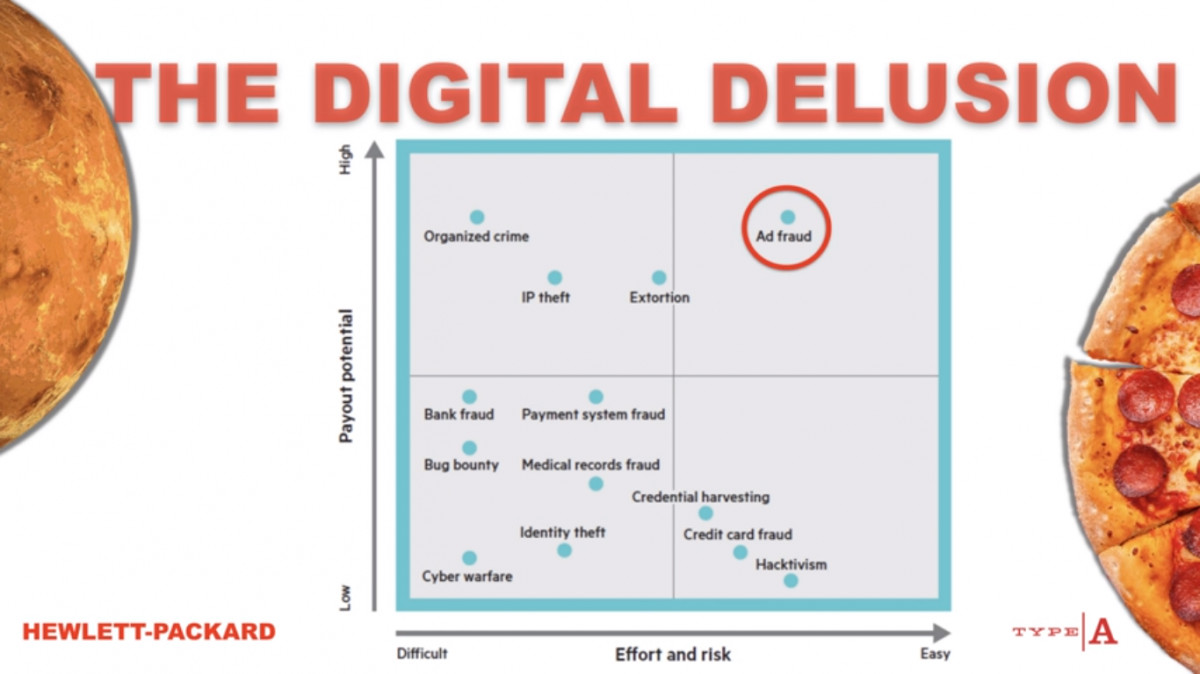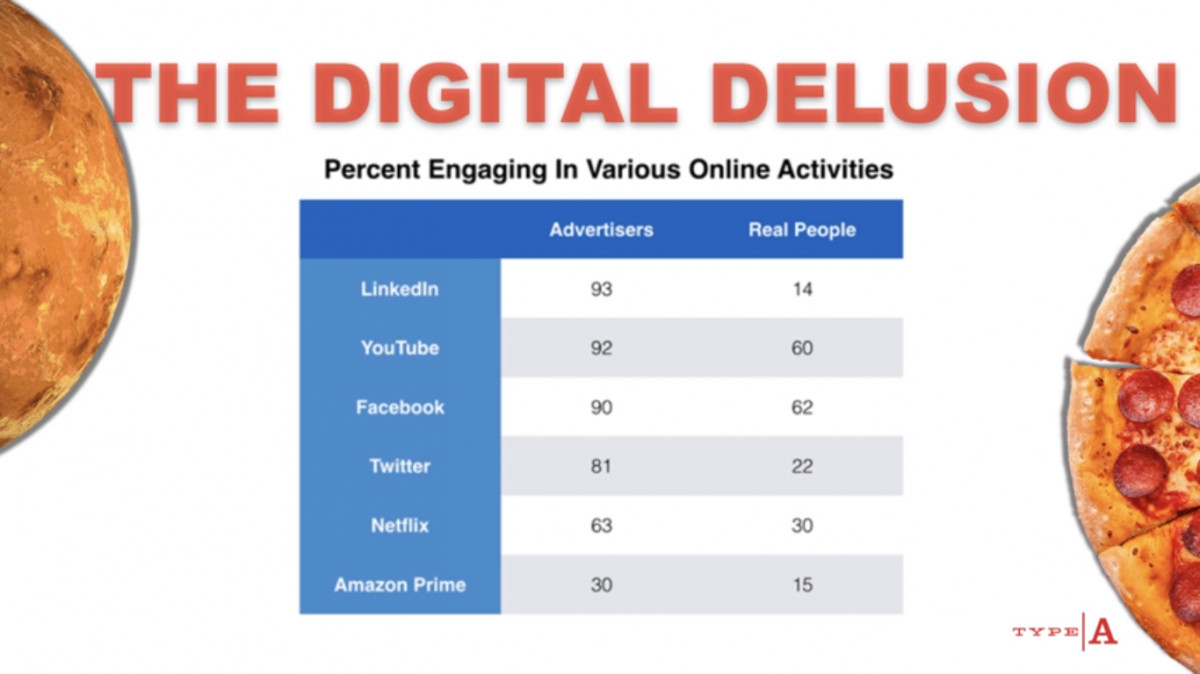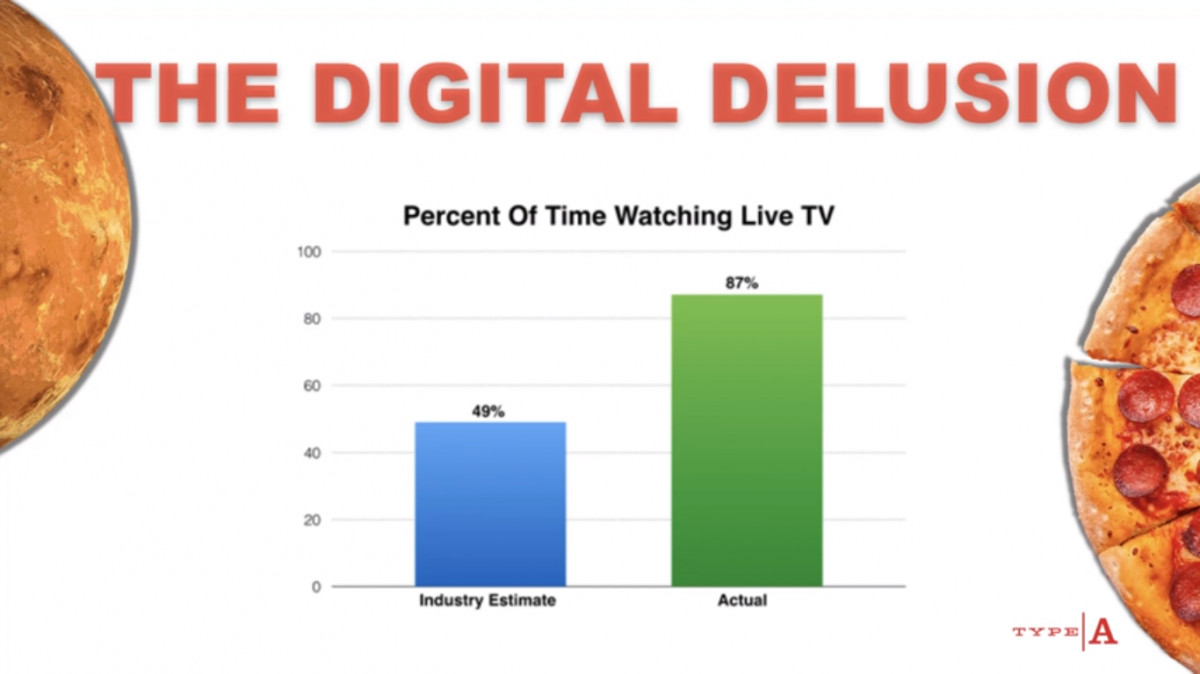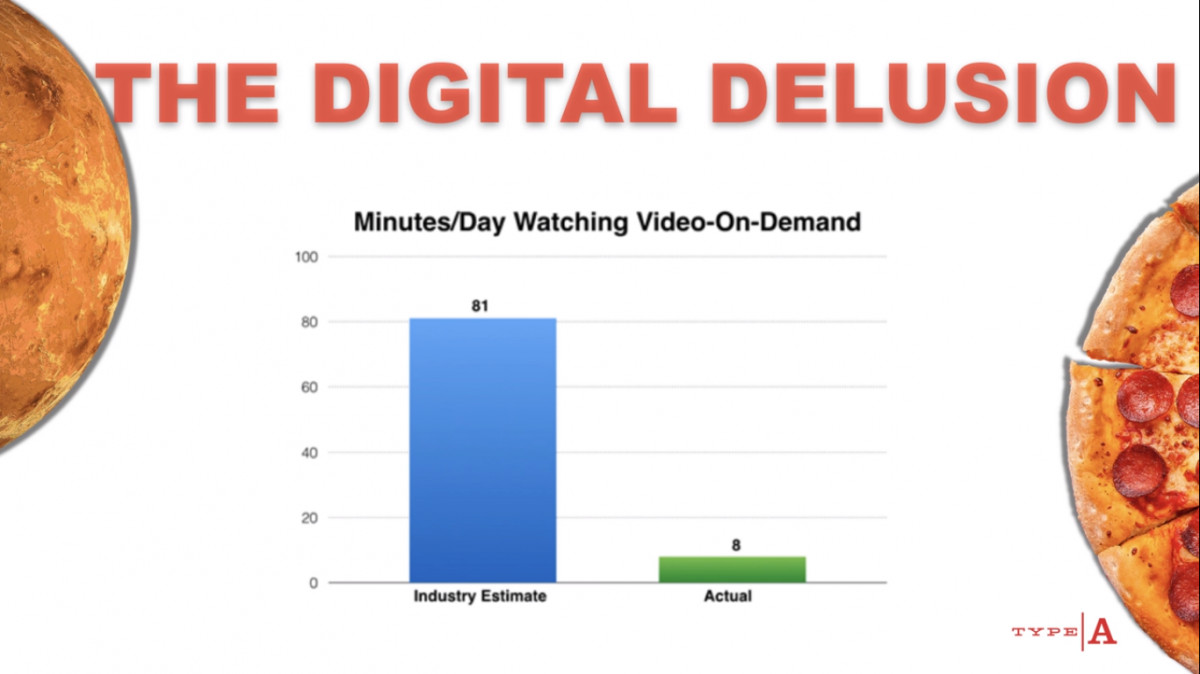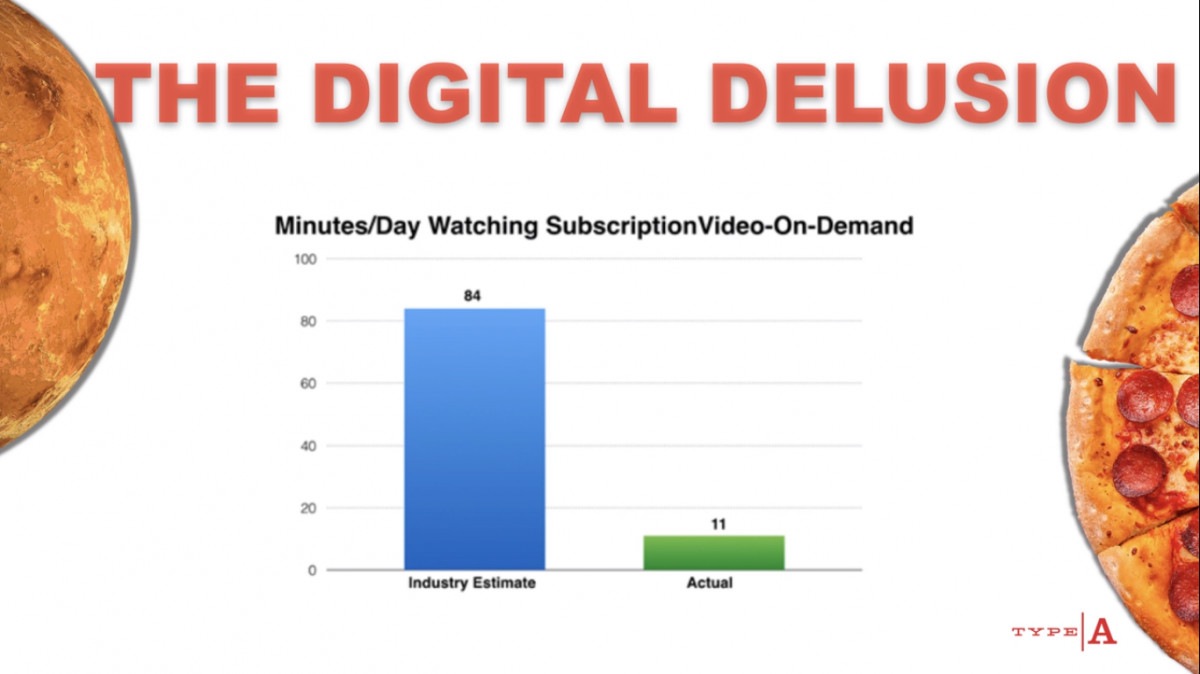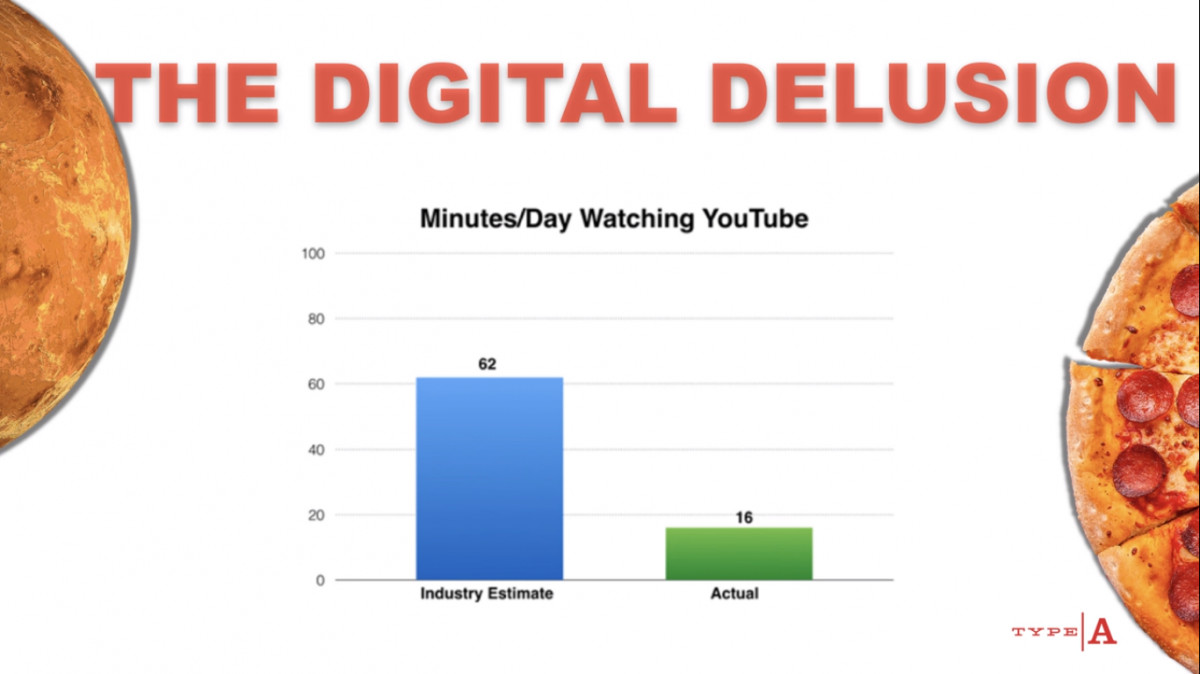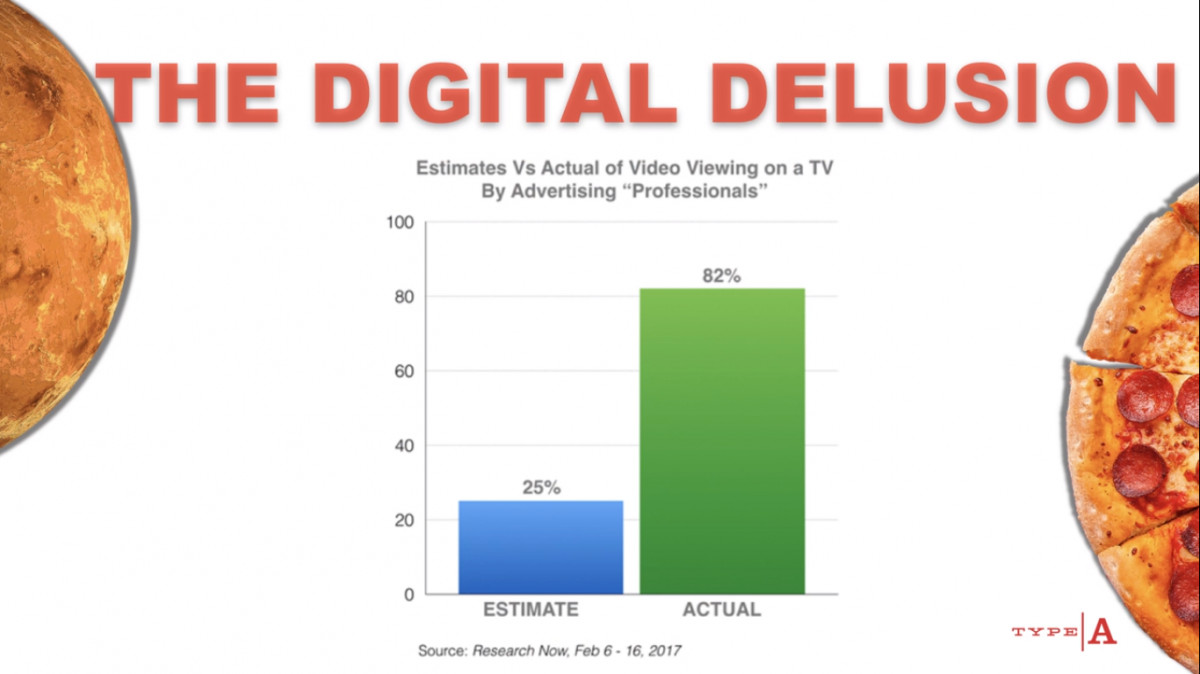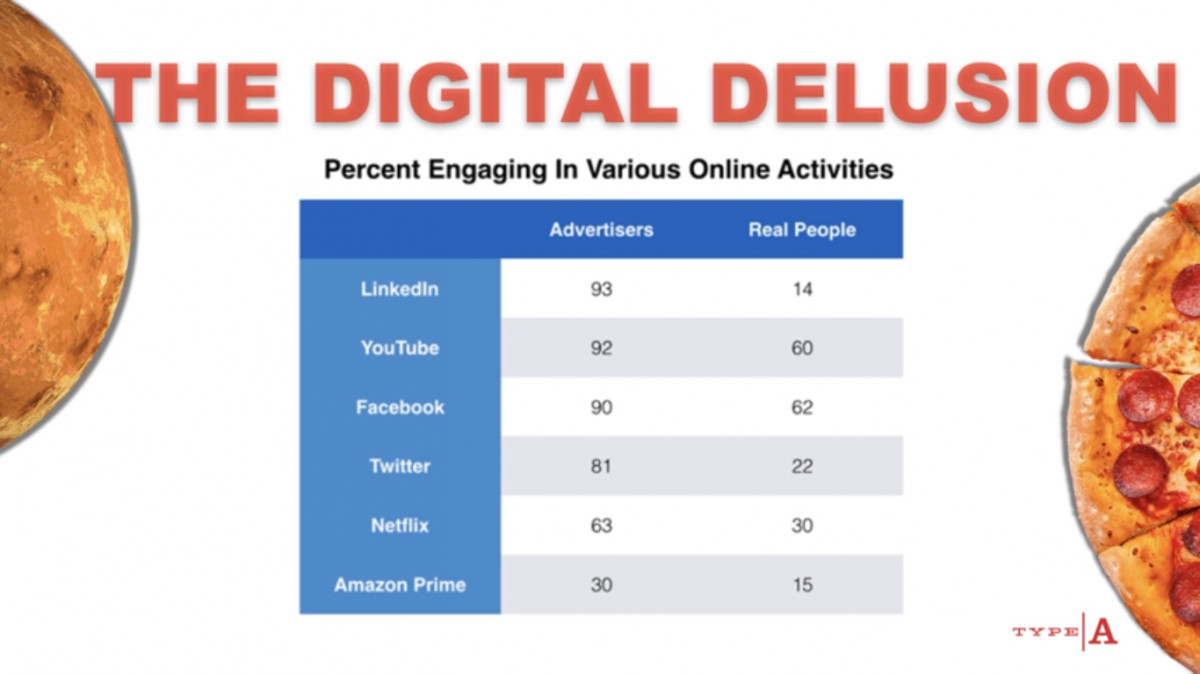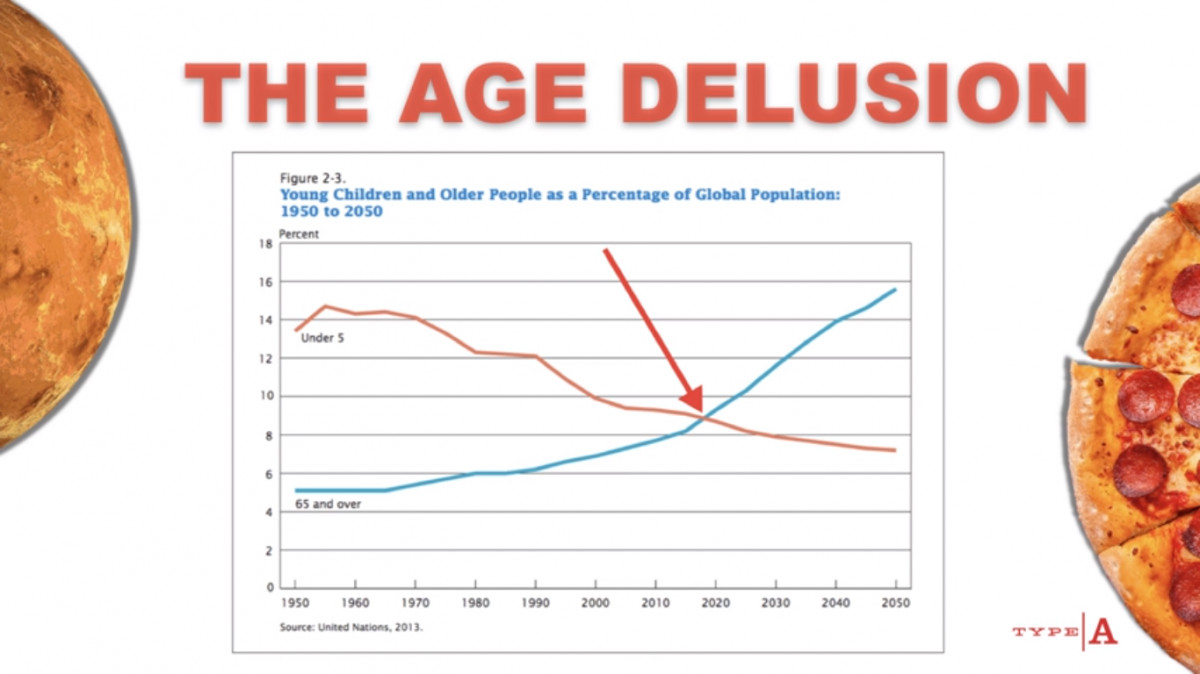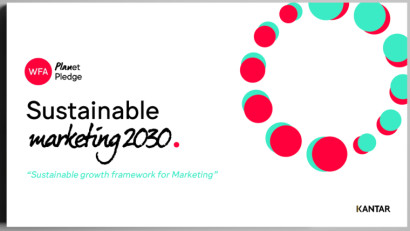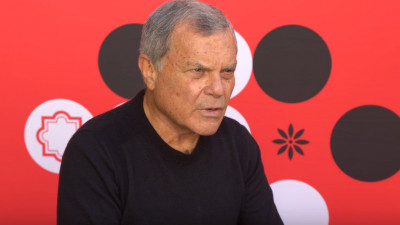During a 2017 talk that took place in London (put forward to you in text format, for your scanning abilities), Bob Hoffman takes a stand for the role of the creatives in the ad industry, claiming that all the other roles should gravitate around them and their ideas - since those alone become ads, thr actual things consumers have contact with. He points out the word 'creative' has two different meanings: one is about doing things creatively, which can be attributed to anyone in any profession, and the other one is about being a creative in an advertising agency, who creates something out of nothing.
Bob argues against a point made by Sir Martin Sorrell, namely that "media has become more important than the message", by saying there’s no way "the canvas is more important than the painting or the instruments are more important than the music". He also states there are no such things as target audience (audience is created by demand, and there's absolutely no demand for advertising) and love marks:
"If Pepsi would disappear tomorrow, Pepsi loyalists would switch to Coke with very little psychological damage. Big Mac lovers would cheerfully eat a Whopper without the need for counseling. Nike loyalists would throw on a pair of Adidas without having to enter rehab".
On marketers, Bob believes they're suffering from 3 delusions: the digital delusion, the brand delusion and the age delusion. Check each one out below.
Creatives matter
I love good advertising, I started my career as a copywriter. After a while I got myself promoted to creative director of few agencies and after proving myself to be an utter failure as a creative director, I was demoted to CEO.
But the one thing I always really wanted to be was a great copywriter. Sadly my copywriting career consisted mostly of holiday weekend mattress sales and low financing on Toyota trucks. But despite my mediocrity, doing creative work was the only thing that really interested me about advertising. The rest was mostly torture.
As far as I was concerned the agency business worked like this: the creative people made the ads and everyone else made the arrangements. Why it took eight times as many people to make the arrangements, I could never figure out. But I guess you could say I was a creative department chauvinist and to be honest I probably still am.
I know how hard you clients work and you account people and planners and media people work and I thank you for your hard work, but no matter how wonderful the briefs are, and the strategies are, and the plans are, at the end of the line there are people who are going to turn these into magic or turn them into dogshit, and those are the creative people.
For better or worse, the consumer never sees the briefing documents or the data or the strategic rationale. All he ever sees are the ads. And if the ads are great, we're all great. And if the ads stink, we all stink.
Advertising is all about ideas
Over the past few years, I've been doing a lot of traveling and a lot of speaking about advertising. Wherever I go in the world, I invariably hear the same two things - advertising is not as effective as it used to be, and advertising is not as creative as it used to be.
And it's very hard for me to believe that these two things are not related. But it seems to me that, in many agencies, creativity is quickly and quietly becoming a support service. The alarming thing about this is that I believe creativity in the agency business is the only thing that is of major value to our clients from an agency. Everything else agencies do, clients can get somewhere else. They can get business strategy from a million different consulting firms. They can buy data by the truckload with a couple of clicks of a mouse.
But the one thing that every successful marketer needs and the one thing that agencies can provide better than anyone else is ideas. But apparently the advertising industry has decided it can no longer support itself by focusing on ideas.
If you remember the aborted marriage between Omnicom and Publicis about a year and a half ago. The rationale for creating the biggest agency in the world had nothing at all to do with creativity. The primary reason given for the merger was their presumed ability to compete with Google and Facebook in the collection and utilization of data. It seems to me that the agency business is betting its future on playing the other guy's game. This is a mistake.
What clients think of agencies
Over 25 years ago I left my first agency and the agency business for the first time. Two years earlier we had sold our independent agency to a publicly traded global network and after two years of working for them, two of the worst years of my life, I decided it was not the life for me. For three years thereafter, I did creative services on my own, directly for clients. In that three-year period being outside of the agency business I learned a very important lesson: secretly, clients hated agencies.
They put very little value on account service or as one client told me:
"All account service does is keep the agency from fucking up. Doesn't do a thing for me."
We’re not all creatives
Behind our backs, the clients chuckled about our supposed strategic brilliance. The value they saw in agencies was in creativity. They believed the only place they could get good ads was from an agency. But creativity is in trouble. There's a kind of mantra I hear in agencies back in the States. I don't know if you hear it too but it goes like this:
"We are all creative" or "Creative ideas can come from anywhere. "
In my opinion this is utter horseshit. In truth, we all think we're creative and we all think creative ideas can come from anywhere, but true creative talent is a rare and precious thing.
Have you ever wondered why there are so many shitty songs and shitty movies and shitty TV shows and shitty books? I'll tell you why. Because it's really fucking hard to do a good one.
The same is true with advertising. No one sits down to write a crappy ad. We all want them to be great. But mostly they just turn out crappy. Why? Because it's really fucking hard to do a good one, and there are very few people who can do it. If you believe we're all creative, then you have to believe that it's just a coincidence that Shakespeare wrote dozens of brilliant plays and you and I and Donald Trump didn't.
Doing things creatively vs. being a creative
I stipulate that when we talk about creativity the word is: confusing. It has two very different meanings. Sadly, the new emperors of advertising are trying their best to muddy the issue and confuse the meanings.
Let me read you a quote from Sir Martin Sorrell, the most powerful man in the history of advertising:
"The snootiness of believing that creativity just resides in the creative department of traditional agencies, that media people can't be creative or data people can't be, or people who do health care or promotion or CRM can't be creative, it's a nonsense and it's insulting to the people who are in those areas."
He's using the word 'creative' to equate doing a practical job in a creative manner with creating something unique from scratch. He's implying they are the same thing.
Don't get me wrong. I love anyone who does a job in a creative manner. I have nothing but respect for account people or planners or data analysts or media people who are working in and around agencies and do their job and imaginatively. But starting with nothing and creating a song or a book or a film or a painting or, yes sometimes even an ad, is a whole different meaning of creativity. And I resent that the exceptional talents of great creative people are being intentionally misrepresented.
You know the guy who made the popcorn at the Globe Theater, may have found a very interesting and creative way to do it, but he didn't write fucking Macbeth. It's a different thing. It's not healthy for the ad business, nor is it healthy for the people in the ad business to think this way.
Our industry has been hijacked by aristocrats with private jets. They have made the agency business leaner and meaner, they have made it more efficient, they have made it more productive, they have squeezed all the fat out of it and in doing so, they are also squeezing the life out of it. Their money managers and investors and financial wise guys, the one thing they are not, is advertising people.
Advertising evolved as an industry of craftsmen and crafts women. Account people, art directors, researchers, copywriters and media people. People who actually work on advertising business would start their own agencies. There were hundreds of independent, entrepreneurial agencies in every country.
When I started in the ad business, 300 years ago, the largest agency in the US was YNR. They had about 1.5 percent share of market. Today, four global monstrosities control over 70% of the advertising spending in the U.S.
The medium or the message?
A while back, Mr. Sorrell gave a talk in London. According to press reports he told the conference:
"Media has become more important than the message."
This is unacceptable. Someone who believes media is more important than the message, also believes the canvas is more important than the painting, the instruments are more important than the music, the bottle is more important than the beer. It's unacceptable and I'm worried.
Call me crazy, but I think ad agencies should be run by advertising people. I don't see Airlines run by green grocers. I don't see hospitals run by folk singers. I am curious why the agency business is being run by bookkeepers.
In an industry led by people who now think delivery systems are more important than what they are delivering, creativity is floundering. We need to convince marketers once again that the most effective way to build a brand is through the unique and unmatched power of a great idea.
There’s no demand for advertising
Last summer, the IPA released a report called: 'Selling creativity short'. In it, they asserted that creativity by itself can make a marketing dollar ten times more effective. But we're losing this war. As Paul said, over 600 million connected devices now have ad blockers loaded on them. This is the largest boycott of anything in the history of humanity. We've got to stop bullshitting ourselves and come to terms with reality.
You know, we talk a lot about a target audience. But there is no audience for advertising. An audience is created by demand. There's demand for music so there's an audience for it. There's demand for movies, so there's an audience for it. There's a demand for television so there's an audience. Or the demand for advertising is precisely zero. There is no audience for advertising. Similarly, the idea that anyone wants to engage with advertising is equally delusional.
We engage with people and things we enjoy. We find books engaging, in music engaging and dance engaging and people engaging. Who in their right mind wants to engage with advertising? On a rainy Sunday afternoon, have you ever heard someone say: 'I'm going back to my flat and engage with some advertising'?
We have to do a lot better. We have to make advertising beautiful or imaginative and I have bad news: algorithms and data and metrics don't do that, only people do that. Let's not allow the devaluation of creativity to continue. I'm tired of hearing that advertising isn't as effective as it used to be or as creative as it used to be. We have so many more amazing tools and amazing media and communication options than we've ever had before.
We should be making wonderful advertising. We have no excuses. Data and analytics and all that stuff, that's all fine and useful but we need to regain our appreciation for the unique gifts of talent and creativity. We need to make it once again the focus of the advertising business.
Marketers are from Mars, consumers are from New Jersey
One of my objectives this evening is to make you uncomfortable. I know you don't like to be uncomfortable, I don't like to make you uncomfortable. But we, in the marketing business, are fed so much bullshit on a daily basis that, from time to time, we need a hard dose of reality. And sometimes, reality is uncomfortable.
I believe we, advertising and marketing people, think we know things that we don't really know.
Let's do a little reality check and see if we can agree that a lot of what we've been told and what we've come to accept as wisdom is dubious at best and, at worst, just plain wrong. The title of this part of my talk is 'Marketers are from Mars, consumers are from New Jersey', which is also the title of my last book.
Mars and New Jersey are very different kinds of places. One is an uninhabitable, desolate lifeless world, and the other one is a planet.
My premise is that marketers - that's us - are very confused. In fact, we're so confused that we have lost touch with reality and also with average consumers or, as I like to call them, people. It's my view that consumers are basically simple creatures, with straightforward needs and easily observed behaviors. Marketers, on the other hand, are complicated bastards with strange customs and mysterious beliefs.
We, marketers, are taught not to think simply. In fact, the whole practice of marketing is based on the conviction that there are forces at work in the minds of consumers that only trained specialist - you know, us - are qualified to interpret. Thinking simply has been beaten out of us.
You cannot be taken seriously in any marketing or advertising organization if you suggest that the bulk of consumer behavior is perfectly obvious. You can't advance your career by speaking plainly and asserting that the reason people buy most stuff is because it's tastier, prettier, cheaper, works better or simply more readily available. That kind of thinking just won't cut it in today's world of professional confusion.
To be taken seriously as a marketer, you need to think and speak in ways that no normal person in the history of civilization has ever thought or spoken. How we think and how consumers think, couldn't be more different.
Here's how marketers think: how can I engage consumers with my brand and create a community? How do I connect the authenticity of my brand with my target audience? How can I co-create with my target and develop a conversation?
Here's how consumers think: Is there going to be parking? Is this fucking thing going to work?
Consumers want clarity and simplicity. Marketers want to complicate the shit out of everything. Every day, we agency people, go into work, we have meetings and we have conference calls and we write briefs and we build PowerPoint decks and we read emails, we read memos, we make presentation, we have uploads and downloads and as a byproduct of all this bullshit, every now and then, an ad appears somewhere.
Marketing assumptions vs. reality
Over 10 years ago, we in the marketing & advertising industry, developed a narrative. The narrative went something like this: the web is going to change everything, television is going to die, online advertising is going to be much more effective because it's interactive. Consumers are going to go online and join the conversation about brands and express their brand enthusiasm.
And all this would be led by a generation of people called Millennials, who would wield unprecedented economic power.
Over 10 years ago we decided what the future was going to be. And today we are behaving as if we were right. In fact, almost all of this has turned out to be wrong, but it hasn't changed the narrative one bit. The same bullshit we were hearing 10 years ago, we are still hearing today - despite the facts.
The result of this is that advertisers are throwing away billions of dollars on ineffective fantasies. As you know, I am from another country and I am NOT an expert on marketing or advertising here in the UK. However, I'd be very surprised if the marketing issues you are facing are very different from the ones that we are facing. It looks to me like the average American is just a Brit with a silly haircut and a gun.
I believe that the marketing industry is suffering from three delusions: the digital delusion, the brand delusion and the age delusion. All of them have one thing in common: they take a little bit of truth and they distort, exaggerate and torture it to the point at which it does, us marketers, more harm than good.
I believe we have been operating under some highly questionable assumptions which have disconnected us from the thinking and behavior of average people.
We have grossly exaggerated the role of brands in the lives of consumers. We have an immoderate and false faith in the death of traditional marketing practices and media. We have largely overstated the value of social media marketing. We are conveniently disregarding the alarming amount of sleaze, fraud and corruption in the online advertising industry.
We are objectively disregarding people over 50, who are the most powerful consumer group in the history of the world. We have grossly inflated the importance of advertising media at the expense of advertising creativity. Other than that, we're doing great.
Personal history
Before we get to the illusions, let me tell you a little bit about myself, so you know what kind of crazy person you're hearing this from. I spent 41 years in the agency business. You think - you're full of shit, I have a lifetime achievement award. As I mentioned, I started my advertising career as a copywriter and through a series of comic mishaps I wound up as CEO of two independent agencies and the US arm of an international agency.
Before I began in advertising, I was a science teacher. There were only two problems with that: I don't know anything about science and I don't like children.
I later went on to spend one year as special assistant to the executive director of the California Academy of Sciences. One of the things being around science and scientists taught me was a healthy respect for the scientific method. Scientists have to go through years of experimentation and peer review and torture before an idea of theirs as accepted as a fact. After years of scrutiny, if their results hold up, they can say they actually know something. Knowing something it turns out is completely different from thinking you know something.
So, then I got into the advertising bit, and the first thing that struck me was that we really didn't seem to know anything. We thought we knew a lot of things. We had ideas about what makes good advertising. We had ideas about changing consumer behavior, but I couldn't find facts. All I could find were assertions and opinions of experts masquerading as facts. We did things that looked and sounded like science.
We use the language and the tools of science. We had questionnaires and computer programs and clipboards, but we didn't use the scientific method. We rarely used controls for our research. We rarely repeated our studies to verify them. We never had peer review of our methods or our conclusions. We never asked third parties to replicate our studies, to validate them.
Science vs. advertising
I'm not blaming researchers for this. It's not their fault the ad industry is not willing to pay for real science, but over time it led me to develop an obnoxious habit. I stopped believing advertising and marketing experts. I don't care what their credentials are or how many awards they've won. If they don't have the facts and they can't explain them to me in simple jargon, free English, I'm skeptical.
Nobel prize-winning, physicist Richard Feynman, said it best:
"Science is the belief in the ignorance of experts."
One of the problems with advertising experts is they have a free pass they go around to conferences, and they talk to the press and they write books and articles, and they make profound and confident statements about our industry, and no one ever goes back and checks up on them. So tonight, we're going to try and do a little of that.
There have been amazing changes in technology and media and communication. And these changes were supposed to bring radical changes in consumer behavior. But as far as I can tell, they've affected our businesses and our work environments far more than they have affected the purchasing behavior of average people.
According to the US Census Bureau, in 2016, about 8% of retail activity in the States occurred online. 92% occurred in a store. According to eMarketer, about 1.5 percent of consumer purchases were made on a smartphone, 98.5% were not made on a smartphone. And yet if you were to read the literature of our industry, you'd have to believe we buy everything online and mostly on our mobile devices.
The digital delusion
From an advertising standpoint, at its core is the belief that online advertising is more effective than traditional advertising because it is interactive. For many years online, advertising was called interactive advertising, until it became clear that no one was interacting with it. And then suddenly the term "interactive" was sent off to bed, never to be heard from again - and it became display advertising.
According to most reports, as Paul said: display ads have an overall click rate of about 6 in 10,000. This is not interactivity, this is absence of interactivity. Solve Media, a company that measures this stuff, says you are more likely to complete Navy SEAL training than click on a banner ad.
The idea that the same consumer who was frantically clicking her TV remote to escape from ads was going to joyfully click her mouse to interact with them, is going to go down as one of the great marketing fantasies of all time.
But this delusion has led to consequences that no one could have foreseen. As we sit here today, online advertising is a mess of historical proportions. Half of what is paid for is not even visible. Fraud is out of control, corruption is rampant, online advertising is despised by consumers, doubted by advertisers, barely sustainable for most publishers, and trusted by no one.
As I mentioned, it has spawned the largest boycott of anything in the history of humanity. Only 52% of traffic on the web is human. The rest are BOTS, scrapers, hackers, spammers and other impersonators.
Not all bots are bad. Nonetheless, the amount of fraud being perpetrated on advertisers by online scammers is astounding. Just last week, a new unimaginably large ad fraud court, called Fireball, was discovered. It has infected 250 million computers and 20% of corporate computer networks worldwide.
Dr. Augustine Fou, a PhD from MIT, now teaching at NYU, one of the world's leading experts on ad fraud, says this operation was capable of producing 30 billion fraudulent ad impressions a minute. Dr. Fou called this 'fraud on such a massive scale it is beyond belief'.
According to the Interactive Advertising Bureau, online advertising fraud reached about 7 billion last year. But the problem is the IAB think they can detect every type of ad fraud there is, but they can't. Two weeks ago, another fraud, called Judy of all things, was detected in the Google Playstore. This fraud produced 1 billion fraudulent impressions a minute and had eluded Google for over a year.
And second, the IAB has an interest in understating the extent of ad fraud. The world federation of advertisers, on the other hand, says ad fraud could be four times that number. If you want to make a lot of money quick, get into the ad fraud business.
Here's a chart from HP showing us why ad fraud is so popular. It has the highest return of any online criminal activity and essentially no one is ever prosecuted for it. According to the world federation of advertisers, within 8 years, ad fraud may be the second largest source of criminal activity in the world after drug trafficking.
But it's not just fraud that's wasting advertiser dollars. According to the Guardian, and confirmed by the WFA, between 60-70 % of online advertising dollars are scraped off by middlemen. Everything that is gray on this chart is money going to middlemen. Despite this, advertisers are pouring more and more money into display advertising. Online advertising is going to surpass TV, this year. It keeps growing by double digits every year, so what's going on?
The efficiency of online advertising
Well, according to the most reputable sources, in 2016, online advertising spending grew about 20 percent in the States. But this number is very deceiving. In fact, for everyone except Google and Facebook, online ad revenues did not grow at all. Unbelievably, in the third quarter of 2016, 99% of all new online ad dollars went to the Goobook duopoly.
They now account for 77% of all online ad revenue in the US. If a duopoly like this, existed in the broadcast world, my government would break it up in a heartbeat. But no one wants to get mired in the mess that is online advertising.
But, say the experts, online advertising is so much more efficient than traditional advertising. With precision targeting enabled by the huge amount of data that are collected through tracking, we can reach the right person at the right time with the right message, right?
Well, for years I've been arguing against this. In 2012, I wrote:
"Big brands made big reach, not the diminishing returns of finer and finer targeting".
In 2013 I wrote:
"One of the great benefits of mass media is that it lacks precision targeting. It reaches all the users in your category".
Well, here's how wrong I was. In 2013, the CEO of Procter & Gamble, the world's largest advertiser, told us:
"Digital is incredibly effective and we're doing more".
By then, P&G had moved over one-third of its online now at one-third of its advertising dollars online. In 2014, P&G's CFO told us:
"Effectiveness and the consumer impact of our advertising spending will be well ahead of the prior year because of an optimized media mix with more digital mobile search and social presence".
And what has been the result of all this precision targeted, optimized digital media brilliance? In a 12-month period, ending in July, P&G sales dropped an astounding 8%. That means they lost 6 billion dollars in sales.
P&G shocked the marketing world a few months ago, by announcing that they were discontinuing their precision targeting advertising on Facebook P&G's Chief Marketing Officer said:
"We targeted too much".
P&G has done a complete 180 on display advertising. Recently, their Chief Brand Officer said:
"We don't want to waste time and money on a crappy media supply chain".
And P&G isn't alone. According to Coca-Cola's formal Global Marketing Chief:
"The ROI on TV is almost twice that of digital".
I know some of you are thinking: "Mr. Loudmouth Bob, everyone's putting more and more money online and they're all wrong and you are right". And the answer is yes.
For the most part, I think they are wrong. Advertisers spend half a trillion dollars a year on advertising. You'd think they'd take the time to know their business. But there is convincing evidence that they are alarmingly misinformed.
Some evidence comes from Thinkbox, here in the UK. They commissioned a study comparing advertisers assumptions about consumer media behavior with the facts of consumer media behavior. The people at Thinkbox are too nice to say this, but I'm not, the results leave very little doubt that most advertisers have no idea what they're doing.
Let's have a look at some of the findings. They asked ad industry executives 'What percent of time people watching video spend it watching live TV?' The executives thought about 49%. The correct answer was 87%. The experts were off by 75%.
They asked: "How many minutes a day they thought people spent watching video on-demand?". The experts said 81 minutes. The actual number was 8 minutes. The experts were off by 900%.
They asked: 'How many minutes per day people watched subscription video on-demand, like Netflix?'. The experts said 84 minutes. The actual number was 11. The experts were off by 600%.
They asked: 'How many minutes a day the average person spent with YouTube?'. The expert said 62 minutes. The correct number was 16, off by almost 300%.
If it's any consolation, advertisers in the US are even stupider. A study released last month, showed that among us advertising and marketing executives, when asked what percent of video watching time was spent with television, they said 25%. The actual number is 82%. They were asked what proportion of video viewing was done on a smartphone. They said 18%. The answer is 2 percent, off by 800 percent.
The obvious question is: 'How can people who work in an industry that is constructed on media behavior be so astoundingly misinformed?'. Every day, millions of dollars are committed based on the supposition that these people know what the hell they're doing. That they know the facts and are spending the money wisely. And yet, they are misinformed to a degree that is mind boggling.
I think there are three reasons: - first is the influence of the avalanche of misleading bullshit in the press. And the torrent of ill informed presentations that we are subjected to, second is the timidity of traditional media who have allowed the digital industry to get away with half-truths, the third is the pervasive fear of being labeled a traditionalist by questioning the digital delusion.
And finally, is the fact that, we advertising people, live in a different world.
Let's have a look at this. This chart compares UK advertisers, social media and online video behaviors to that of real people. If you had any doubt that we live in a different world from our customers, this ought to clear it up.
A while back I was speaking to the employees of NBC, which is one of the major TV networks in the US. I asked them how much video viewing they thought was done on a TV versus a web device. The consensus was about 50/50. The actual numbers were 95% TV, 5% online. And these people work in television.
Now I'm sure there are people who disagree with me about the digital delusion, so I would like to invite you to become a scientist. Don't believe a word I say, do your own experiment.
Go to the biggest supermarket in your neighborhood, walk up and down the aisles, take out a piece of paper and write a list of all the products and all the brands you can find that were built by online advertising. All the brands of toothpaste, beer, cereal, soap, soda, snacks, cheese, shampoo, and I think you'll find what I found. You have a blank piece of paper.
Sure, there are some big web-native brands, that online advertising has helped build: Netflix, Amazon. But how about the overwhelming majority of brands that don't live on the web? Where are the brands of soda / fast-food / cars / toasters / refrigerators / snacks that were built by online advertising?
If you think I'm just a cranky nut, let me give you a quote from no less authority than the Interactive Advertising Bureau, here in the UK: "Banner ads aren't working anymore." Forrester Research is even more definitive: "Display advertising never worked like we pretended. CMOs know this but nobody wants to talk about it."
There's something striking about the phenomenal success of Apple. Despite being history's most successful technology company and having two of the world's most successful online transactional stores: the iTunes Store in the App Store. Almost all of Apple's advertising money is spent in traditional media. It's overwhelmingly TV and outdoor in print. And what have we wizards of marketing and advertising learned from Apple? Nothing.
The brand delusion
I believe that creating a strong brand should be every marketers primary objective. And the highest goal of advertising is to create a strong brand. And I'm sure most of you agree with that.
But our industry has taken these truths and distorted them into silly fantasies. There is a widespread fantasy in our business that consumers are in love with brands. That consumers want to have brand experiences and brand relationships and be personally engaged with brands and read branded storytelling and co-create with brands.
Let's listen to Saatchi&Saatchi's description of what they call lovemarks: "They reach your heart as well as your mind, creating an intimate, emotional connection that you just can't live without."
It's very touching. Unfortunately, it's horseshit. In fact, according to a story by a study by Havas Media in Europe and the US, people would not care if 92% of brands disappeared. To be honest, I wouldn't care if Havas Media disappeared. That's another circle. Oh, there's anyone here from Havas? I'm just kidding.
One consequence of this bullshit is that we have spent 10 years and billions of dollars on the social media fantasy, exhorting people to join the conversation about our brands. What I want to know is what conversation. All you have to do is go to your Facebook page or your Twitter feed and if you can read, you can see that no one is having a conversation about brands. Facebook has turned into a festival of traditional paid advertising. There isn't a conversation about a brand anywhere in sight.
In an article, in a recent issue of the Harvard Business Review, the authors report:
"Across 16 studies, we found no evidence that following a brand on social media changes people's purchasing behavior".
A study by Duke University, the American Marketing Association and Deloitte, said over 88%of senior marketers surveyed said they found no measurable impact from social media marketing.
A study by Forrester Research reported that only 0.07%, that 7 in 10,000 of a major brand’s Facebook followers, ever engage with one of its posts. On Twitter the numbers even lower: 4 in 10,000. And remember this isn't for consumers in general, this is just for the tiny component of the population who already turned themselves in and became followers of the brand.
And yet, there are still people in our business who believe that consumers are in love with brands. You go to their Twitter profiles: "I'm passionate about brands". You what?
Once again, let me state the obvious. Yes, having a strong brand should be every marketers primary objective and yes the highest goal of advertising is to create a strong brand. But that's it. No, for the most part consumers are not in love with brands. Despite all the baloney we hear from social media experts, for the most part consumers do not want to have a conversation with your brand, or an authentic relationship with it, or engage with it or co-create with it or spend the romantic seaside weekend with it.
Now, of course, brand preferences exist. And that's what advertising is striving to achieve. But brand love is mostly a juvenile fantasy. Most of what we call brand love is simply habit convenience, mild satisfaction or easy availability. If you're a marketer and you believe people love your brand because they happen to buy it, you're headed for trouble.
Are some consumers strongly attached to a few brands? Sure, we are. But remember a recent report said that the average westerner has about 10,000 items in their household. And we're a strongly attached to what? Maybe a handful of brands? I promise you, if Pepsi would disappear tomorrow, Pepsi loyalists would switch to Coke with very little psychological damage. Big Mac lovers would cheerfully eat a Whopper without the need for counseling. Nike loyalists would throw on a pair of Adidas without having to enter rehab.
I think it's very wise to assume that consumers don't care deeply about our wet wipes and our frozen chicken strips and our batteries. In fact, a smart marketer assumes that no one gives a flying shit about her brand. She assumes she has to prove its value to her customers every day of the year.
She takes nothing for granted. She does not believe there are hoards of brand ambassadors, out there in cyber-land, advocating for her brand. If there are some, great, but she's not going to count on it. She does not delude herself into believing that there are legions of people who want to engage with her brand or share her brand stories. There are some, great, but she's not going to bet the future on it.
For a smart marketer, every day is Groundhog Day. Every day you have to get up, drag your ass to work and remind the world once again why they should buy your stuff. The point is this: our brands are very important to us, marketers, and not very important at all to most consumers.
The age delusion
Finally, we have one last delusion to talk about: the age delusion. One of the practices of the ad industry that I've never understood is why we spend so much of our time money and energy talking to young people and so little talking to older people. In fact, I have come to believe that most marketers target, young people, because they see everyone else doing it. And they assume that somewhere there must be someone who knows why the hell we're doing this.
Here are the facts. According to Nielsen: "People over 50 are the most valuable generation in the history of marketing". In the U.S. they are responsible for over 50% of all consumer spending. They out-spend the average consumer in nearly every major category: food household items, entertainment, personal care, automotive. They account for 55% of all consumer packaged goods sales and dominate 94% of consumer packaged goods categories.
They out-spend other adults online on a 2:1 per capita basis. They have a net worth about three times that of other generations. They buy about 50% of all new cars. They control about 70% of the wealth in the U.S. If they had their own country, Americans over 50 would be the third largest economy in the world, bigger than Germany, Japan or India. And the future, between now and 2030, the population of adults over 50 will grow at about three times the rate of adults under 50.
Do you really think it's a good idea to ignore these people? And yet, people over 50 are the target for 10% of marketing activity in the US.
Well, everyone in marketing is obsessed with millennials. We are going through one of the greatest demographic changes in human history. And it's being completely ignored.
This chart from the United Nations demonstrates an astounding demographic change that's occurring in just a hundred years. In the year 1950, there were three times as many people in the world under the age of five as there were over 65. By 2050, there will be twice as many people over 65 as there are under five. Our population is aging at a remarkable rate.
And the aging is far more pronounced here in the UK, while worldwide the median age of population is 29.6 years old, here in the UK the median age is 40.5. But we have invented all kinds of convenient bullshit for why we ignore mature people.
The real reason we ignore them is that we hate them. The marketing and advertising industries hate old people. We like the excitement of youth, not the boredom of middle age or the frailties of old age. We can't build ourselves a hot advertising career by talking to old farts.
Consequently, we have invented all kinds of baloney to justify our malpractice. While the over 50 population of the U.S. is 42%, the over 50 population of the advertising industry is under 6%, demographic cleansing of the advertising industry.
Our neglect of mature consumers and our pandering to young people is nothing but marketing by selfie stick. It is narcissism disguised as strategy.
I guess Forbes summed it up best: "People over 50" they said, "are the most ignored wealthy people in the history of marketing."
The advertising and marketing industries are two of the most imitative and conformist businesses in the world. Once something becomes trendy, it is difficult, in fact dangerous, for someone to go against the grain. I could never have said to my clients, four years ago, when I was CEO of an ad agency, what I have said here tonight. It would have been too dangerous.
Now things are changing. Things are always changing. And today things are changing more rapidly than ever. I'm not saying we should ignore change or ignore online advertising or ignore young people. I'm saying we need to get some perspective back and get over our obsessions and our delusions.
We need to stop falling for the exaggerated, irresponsible horseshit that has been sold to us by people with an ideological or financial interest in creating hysteria and promising miracles.
My advice: Don't listen to loud mouths like me. Give yourself the wonderful freedom of skepticism. Dig out the facts for yourself. Nobody is smarter than the facts. I'm dismayed that our industry which is supposed to be creative and forward-thinking has been operating on unreliable principles and fanciful delusions that have been sold to us by people who've been wrong over and over.
The marketing and advertising industries have been spending too much time on another planet. We need to get back down to earth.
VIDEO. Take Fucking Risks with Bob Hoffman


![[Inspiration Archive] Bob Hoffman: It seems to me that, in many agencies, creativity is quickly and quietly becoming a support service](https://media.iqads.ro/2019/07/bh-cover-850.jpg?v=201907220225)
